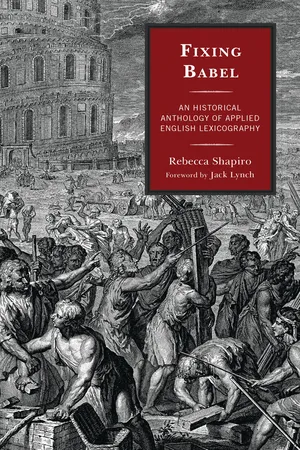
- English
- ePUB (mobile friendly)
- Available on iOS & Android
eBook - ePub
About this book
We all think we know what a dictionary is for and how to use one, so most of us skip the first pages—the front matter—and go right to the words we wish to look up. Yet dictionary users have not always known how English "works" and my book reproduces and examines for the first time important texts in which seventeenth- and eighteenth-century dictionary authors explain choices and promote ideas to readers, their "end users." Unlike French, Spanish, and Italian dictionaries compiled during this time and published by national academies, the goal of English dictionaries was usually not to "purify" the language, though some writers did attempt to regularize it. Instead, English lexicographers aimed to teach practical ways for their users to learn English, improve their language skills, even transcend their social class. The anthology strives to be comprehensive in its coverage of the first phase of this tradition from the early seventeenth century—from Robert Cawdrey's (1604) A Table Alphabeticall, to Samuel Johnson's Dictionary of the English Language (1755), and finally, to Noah Webster's An American Dictionary of the English Language (1828). The book puts English dictionaries in historical, national, linguistic, literary, cultural contexts, presenting lexicographical trends and the change in the English language over two centuries, and examines how writers attempted to control it by appealing to various pedagogical and legal authorities. Moreover, the development of dictionary and attempts to codify English language and grammar coincided with the arc of the British Empire; the promulgation of "proper" English has been a subject of debate and inquiry for centuries and, in part, dictionaries and the teaching of English historically have been used to present and support ideas about what is correct, regardless of how and where English is actually used. The authors who wrote these texts apply ideas about capitalism, nationalism, sex and social status to favor one language theory over another. I show how dictionaries are not neutral documents: they challenge or promote biases. The book presents and analyzes the history of lexicography, demonstrating how and why dictionaries evolved into the reference books we now often take for granted and we can see that there is no easy answer to the question of "who owns English."
Frequently asked questions
Yes, you can cancel anytime from the Subscription tab in your account settings on the Perlego website. Your subscription will stay active until the end of your current billing period. Learn how to cancel your subscription.
At the moment all of our mobile-responsive ePub books are available to download via the app. Most of our PDFs are also available to download and we're working on making the final remaining ones downloadable now. Learn more here.
Perlego offers two plans: Essential and Complete
- Essential is ideal for learners and professionals who enjoy exploring a wide range of subjects. Access the Essential Library with 800,000+ trusted titles and best-sellers across business, personal growth, and the humanities. Includes unlimited reading time and Standard Read Aloud voice.
- Complete: Perfect for advanced learners and researchers needing full, unrestricted access. Unlock 1.4M+ books across hundreds of subjects, including academic and specialized titles. The Complete Plan also includes advanced features like Premium Read Aloud and Research Assistant.
We are an online textbook subscription service, where you can get access to an entire online library for less than the price of a single book per month. With over 1 million books across 1000+ topics, we’ve got you covered! Learn more here.
Look out for the read-aloud symbol on your next book to see if you can listen to it. The read-aloud tool reads text aloud for you, highlighting the text as it is being read. You can pause it, speed it up and slow it down. Learn more here.
Yes! You can use the Perlego app on both iOS or Android devices to read anytime, anywhere — even offline. Perfect for commutes or when you’re on the go.
Please note we cannot support devices running on iOS 13 and Android 7 or earlier. Learn more about using the app.
Please note we cannot support devices running on iOS 13 and Android 7 or earlier. Learn more about using the app.
Yes, you can access Fixing Babel by Rebecca Shapiro in PDF and/or ePUB format, as well as other popular books in Personal Development & Historical & Comparative Linguistics. We have over one million books available in our catalogue for you to explore.
Information
Table of contents
- Foreword
- Acknowledgments
- Introduction
- Editorial Method
- List of Abbreviations
- List of Illustrations
- William Clark
- Robert Cawdrey
- [I. B.] John Bullokar
- Henry Cockeram
- Edmund Coote
- Thomas Blount
- Edward Phillips
- John Ray
- Elisha Coles
- Anonymous
- Abel Boyer
- [J. K.] John Kersey
- John Kersey [J. K. Philobibl.]
- Anonymous
- John Kersey, [Philobibl.]
- Nathan Bailey
- Thomas Dyche
- B. N. [Benjamin Norton] Defoe
- Nathan Bailey
- Thomas Dyche and William Pardon
- Samuel Johnson
- Benjamin Martin
- Samuel Johnson
- Joseph Nicol Scott
- Samuel Johnson
- James Buchanan
- William Johnston
- John Trusler
- William Kenrick
- James Barclay
- John Ash
- William Perry
- John Walker
- Thomas Sheridan
- Francis Grose
- John Walker
- Hester Lynch Piozzi
- Noah Webster
- Noah Webster
- Dictionaries with Their Complete Titles
- Bibliography
- About the Author